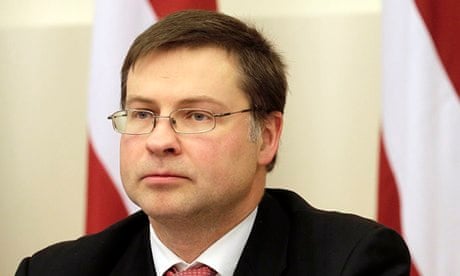Latvia's prime minister has resigned after accepting political responsibility for the collapse of a supermarket roof in the capital that killed 54 people.
Valdis Dombrovskis' decision means that his center-right government automatically falls. He was the longest serving prime minister in Latvia's history.
"Considering the ... tragedy and all the related circumstances, the country needs a government that has a majority support in parliament and can solve the situation that has arisen in the country," Dombrovskis told journalists after meeting President Andris Berzins.
Last week's collapse of the Maxima supermarket was the worst disaster since Latvia declared its independence from the Soviet Union in 1991, and has caused outrage among Latvians.
Police have opened a criminal investigation into the cause of the disaster. Possible explanations include a flawed design, substandard construction materials, and corruption.
Berzins has accepted the resignation and is now searching for a candidate who will need to put together a new coalition, the president's office said.
Dombrovskis came to power in 2009 as Latvia's economy was sinking into a deep recession and was charged with leading harsh budget cuts and tax increases while at the same time implementing tough structural reforms demanded by international organizations such as the International Monetary Fund.
Dombrovskis was re-appointed twice as prime minister since then, and is widely credited with preventing the small Baltic nation from going bankrupt.
Latvia's economy has returned to growth and was the fastest growing in the European Union over the past two years.
On January 1, Latvia will become the 18th member of the euro area.
